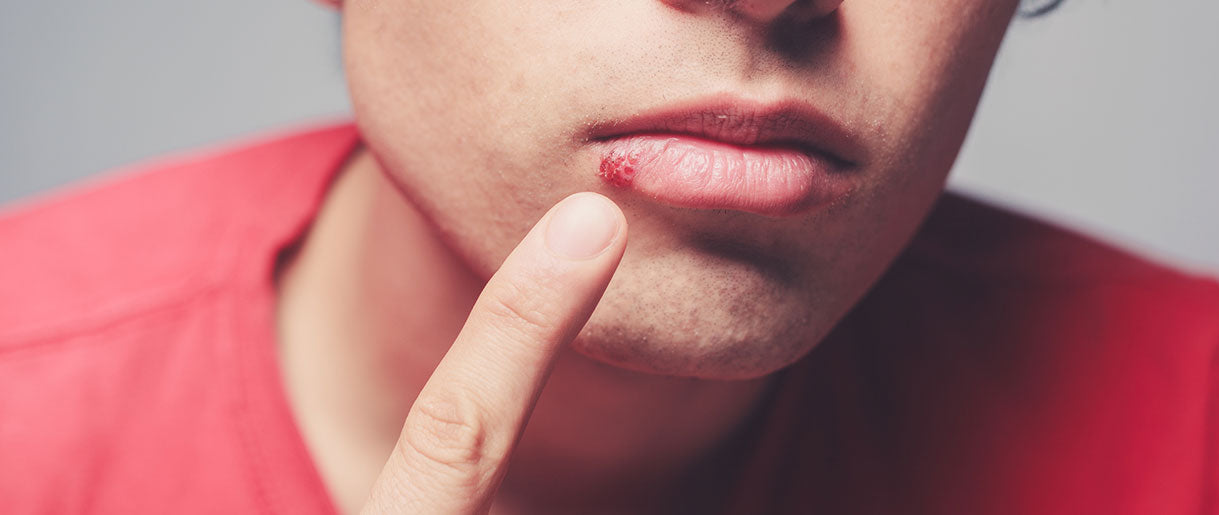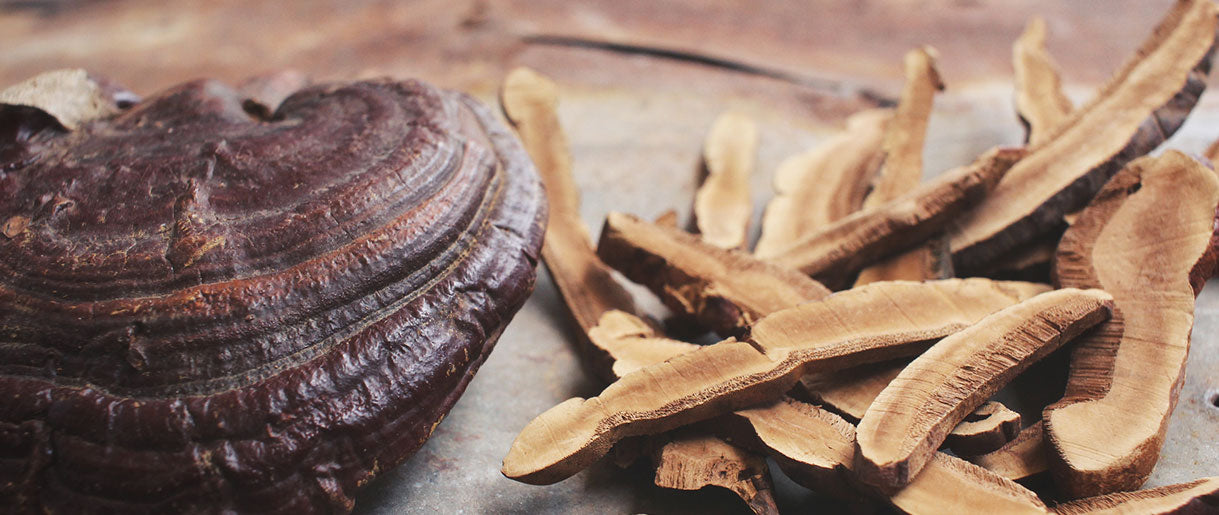The wellness industry is flooded with superfood mushrooms. However, regarding functional mushrooms, there are a few that reign supreme.
This unique subset of edible fungus doesn't just taste nice but also packs vitamins and nutrients. Chaga and Reishi are popular options, but which one should you pick?
In this article, we'll break down the key differences—and similarities—between Chaga and Reishi so you can make an informed decision. Stay tuned for the ultimate showdown!
What Are Reishi And Chaga?
Touted as the king and queen of medicinal mushrooms, Chaga and Reishi share many similarities yet are poles apart.
Reishi, also known as Ganoderma Lucidum or Lingzhi, is a bitter-tasting fungus that grows on dry or decaying tree trunks and logs. It is soft, flat, and cork-like in its fresh state and can be consumed raw or in the form of supplements and mushroom extracts.
Reishi mushroom contains(1) polysaccharides, beta-glucans, and triterpenes (Ganoderic acids) structurally similar to steroids.
Read More: Learn the full benefits of Reishi mushrooms.
Chaga is an irregular and cracked brown-black fungus that grows slowly for years. The mushroom resembles burnt charcoal appearing as a black lumpon birch trees, oak, cherry, and alder trees.
Chaga mushroom is nutritionally dense and contains health-supporting compounds like amino acids, calcium, zinc, potassium, vitamins B and D, and beta-glucans.
Read More: See all the benefits of Chaga mushrooms.
In Chaga vs. reishi discussion, one way to compare the two is through their appearance. From the above Chaga reishi definition, it is easy to see that the two mushrooms look very different in their natural habitats.
Another way to compare Chaga vs. reishi mushrooms is through the vital nutrients they carry. For example, Chaga does have some compounds that are not present in Reishi.
To better understand how these two mushrooms differ, read about Reishi and Chaga's benefits below.
Reishi Vs. Chaga: The Benefits Of The Two Superfood Titans

Reishi mushroom is called the mushroom of immortality due to its numerous benefits. Thousands of years of its use and numerous studies have shown that Reishi builds a more robust immune system(2) and helps destroy foreign particles in the body. It also down-regulates(3) the overactive immune system, thus helping in allergic conditions and autoimmune diseases.
Regular use of the reishi mushroom is associated with reducing blood pressure and cholesterol levels—this eliminates the risk of lifestyle disease. There is also scientific evidence of the mushroom's anticancer benefits(4).
Lingzhi is also beneficial in liver and stomach injuries(5). The mushroom also helps the body in other ways—these ways include:
- Accelerates the healing of gastric ulcers
- Protects the liver from the harmful effects of chemical substances
- Reishi also aids in improving sleep quality(6)
The Chaga mushroom, Inonotus obliquus, is the king of medicinal mushrooms. Adding Chaga to your diet improves your health because of antioxidants and other compounds.
The mushroom is an antioxidant powerhouse that scavenges the free radicals in the body. Chaga has more antioxidants than Reishi.
Chaga has the highest(7) Oxygen Radical Absorbent Capacity (ORAC) score in any natural food. The higher the ORAC score, the more free radicals it can destroy.
This property of Chaga fights oxidative stress(8). Hence, regular consumption of Chaga mushrooms helps with radiant and youthful skin, hair, and nails.
Chaga mushroom kills cancer cells. It also fights(9) against Hepatitis C Virus (HCV) and Human Immunodeficiency Virus (HIV). The mushroom extracts promote lipid metabolism(10) and relieve Colitis(11). It also helps in reducing inflammation(12) of the pancreas.
Below, we will take a look at the shared benefits—backed by research information—of both Chaga and Reishi:
1. Chaga And Reishi Have Cancer Treatment Benefits
Chaga treats cancer—research studies have proved this. A research study conducted in 2016(13) concluded that the Chaga extracts show solid anti-tumor properties.
A more recent research study conducted in 2021(14) showed that through the activation of AMPK and the inhibition of the mTOR signaling pathway, Chaga mushroom extract promoted autophagy. The research study results indicated that Chaga mushrooms might be an effective supplemental treatment for breast cancer patients.
Research has also demonstrated the reishi mushroom cancer benefits. A research study conducted in 2012(15) concluded that given its ability to improve tumor response and stimulate host immunity, the reishi mushroom could work as an alternative adjunct to conventional cancer treatment.
An earlier research study(16) demonstrated that in studies using cancer cells, Ganoderma Lucidum (reishi mushrooms) exhibits anticancer activity and may have therapeutic potential as a dietary supplement for an alternative therapy for breast and prostate cancer.
Reishi and Chaga mushrooms can prevent and treat colon, colorectal, prostate, and other cancers. The mushrooms also offer anti-inflammatory properties that further promote their health benefits for different types of cancer.
2. Chaga And Reishi Help With Diabetes Treatment
Diabetes is a serious health condition that affects more than 37 million Americans, according to the Centers for Disease Control (CDC)(17). Luckily for people dealing with diabetes, natural solutions are available. For example, Chaga has benefits for diabetes.
Researchers performed a study(18) to evaluate the impact of Chaga mushrooms on high blood sugar levels. According to the study's results, taking Chaga supplements for three weeks reduced blood sugar levels in diabetic mice by 31%.
Research has demonstrated Reishi's diabetes benefits. A research study conducted in 2015(19) analyzed the performance of Reishi in diabetes treatment. The study noted that Reishi mushroom polysaccharides exhibit hypoglycemic effects. The mushroom extracts raise plasma insulin levels and lower plasma sugar levels in mice.
The author of the 2015 research study noted that diabetes has a prospective therapeutic target in the protein tyrosine phosphatase 1B, which Reishi mushroom proteoglycan blocked in vitro. The research also demonstrated that Reishi mushroom triterpenoids have inhibitory activity on aldose reductase and glucosidase, hence reducing postprandial hyperglycemia.
Additionally, the same 2015 research study determined that in diabetic mice, a protein called Ling Zhi-8 isolated from reishi mushroom markedly reduced lymphocyte infiltration and boosted the antibody detection of insulin.
3. Both Chaga And Reishi Offer Skin Benefits

Skin problems affect a large group of people in the United States—according to the American Academy of Dermatology (AAD)(20), 1 in 4 Americans (about 84.5 million Americans) has dealt with skin issues. Luckily, research shows that using Chaga mushroom tea and reishi herbal supplements can help treat skin issues.
Research has proven the Chaga skin benefits. The fact that the Chaga mushroom offers cancer benefits means that it is very effective in preventing and treating melanoma. Melanoma is a form of skin cancer.
Research has also proven that Reishi carries numerous skin benefits. In 2019, researchers conducted a study(21) to determine Reishi's therapeutic actions on skin health issues.
The researchers concluded that ingredients in a reishi mushroom, such as polysaccharides, can mitigate postburn infection, promote wound healing, and reduce ischemia-reperfusion harm to skin flaps. Because of the roles that Ganoderma extracts play in skin photoaging and skin whitening, they work in skin care products.
Read More: Learn more about Reishi skin benefits.
4. The Two Wonderful Mushrooms Offer Blood Pressure Benefits
Chaga is an adaptogenic medicinal mushroom with one of the highest Oxygen Radical Absorbancy Capacity (ORAC) values. The mushroom can fight oxidative stress with an ORAC value of over 146700. Since the pathogenesis of hypertension is linked to oxidative stress, Chaga resists high blood pressure.
Reishi helps with high blood pressure treatment too. In a research study conducted in 2018(22), the mushroom proved to have the same hypertension treatment benefits as a hypertension drug known as losartan. The mushroom provided these results after only seven weeks of use.
5. Chaga And Reishi Offer Anti Aging Properties
We do not want to grow old. What's more, none of us wants to start displaying signs of aging while we are still in our youthful years. Luckily, both Chaga and Reishi also offer anti-aging benefits.
To begin with, Reishi has hair benefits. The beneficial compounds in Reishi prevent premature balding and greying of hair, helping you retain a full head of hair that displays the perfect color.
Even better, Chaga improves hair health, ensuring both men and women have healthy hair on their heads.
What's more, both Chaga and Reishi are antioxidants. The two mushrooms inhibit the inflammatory pathways by removing free radicals from your body.
Free radicals are known to cause damage to unstable cells, which leads to premature aging. By taking out the free radicals, both mushrooms slow down the process of aging.
6. Reishi And Chaga Helps With Weight Loss
Statistics show that obesity is growing in the United States. According to the CDC(23), the prevalence of obesity was standing at 41.9% in the United States in 2017.
Obesity increased by over 11% between 2000 and 2017. Moreover, within this period, severe obesity moved from 4.7% to 9.2%.
Luckily, for people who are trying to lose weight, Chaga and Reishi can help. A research study conducted in 2015(24) showed that Ganoderma lucidum (Reishi mushroom) decreases obesity in rats by altering the composition of the gut microbiota.
On the other hand, Chaga tea offers weight loss benefits by suppressing appetite. The mushroom reduces the risk of gaining weight and facilitates weight loss by ensuring people consume fewer calories.
Chaga Vs. Reishi: How Are They Similar? What Are The Differences?

Reishi and Chaga are similar in many aspects; however, they are not the same thing.
Both mushrooms have been used in traditional Chinese medicine for centuries. Both mushrooms have potent anti-inflammatory and antioxidant properties.
They kill bacteria and lower blood cholesterol levels. Chaga and Reishi are also known to support the liver, kidneys, heart, and brain functions.
Read More: See the best mushrooms for brain health.
Both Reishi and Chaga are adaptogen mushrooms. They help the body to resist and adapt to stress.
Both mushrooms help slow down the aging process. The two mushrooms are also known to boost and maintain healthy energy levels and promote exercise recovery after a challenging workout.
The two mushrooms can help with emotional balance by ensuring hormone balance.
Read More: See how Reishi supports hormonal balance.
The fact that both mushrooms are adaptogens means that they allow the body to calm down and relax at night. Therefore, Chaga and Reishi improve sleep quality at night.
Chaga and Reishi improve mental clarity. The mushroom supplements are available in various options, ranging from powders and capsules to tinctures.
One of the key differences between the mushrooms is their place of origin. Reishi mushrooms are native to the Asian continent, typically on the humid Chinese coast. Chaga mushrooms grow in the cold climate of Siberia, Russia, Kazakhstan, Finland, Alaska, Canada, and North America.
The mushrooms also have their specific benefits. Reishi mushrooms can balance the central nervous system. It can contribute to faster recovery from exercise(25) and improve sleep quality.
Read More: See how Reishi improves sleep quality.
The antioxidant property of the mushroom helps in clearing the exercise's metabolites, leading to exhaustion and soreness. Reishi also improves circulation and muscle endurance(26), making it an ideal pre and post-workout supplement.
Both mushrooms modulate the immune system. Reishi, however, contains higher levels of beta-glucans and polysaccharides than Chaga. It enhances and stimulates the immune system better than Chaga and is a better option for boosting the immune system.
Chaga and Reishi have potent anti-tumor activity. While Chaga kills tumors of the brain, skin (malignant melanoma), colon, and ovaries, Reishi is potent against white blood cells, prostate, lungs, soft tissues, ovary, breast, breast, bladder, and colon tumors.
Can I Take Chaga And Reishi Together?

After going through the differences and similarities between Reishi and Chaga, you may want to know whether reishi and Chaga mushroom powder are a good combination.
Read More: What's the ideal Chaga dosage?
The effects of these mushrooms are more powerful when you take them together. When used together, the mushrooms have synergistic effects, causing the beneficial compounds to support each other inside the body.
Chaga mushroom boosts energy and eliminates fatigue, while Reishi helps in relaxation. The opposite nature of Reishi Chaga can seem like a strange combination.
But the Chaga Reishi blend balances them out. A Chaga Reishi mushroom tea gives just the perfect energy boost without the jitteriness, balanced out by Reishi's calming and soothing effects.
The combination of the mushrooms also protects you from stress. The high antioxidant(27) concentration of both mushrooms reduces cellular stress, improves the functions of the immune system, and decreases the overall risks of diseases.
All these reasons make the Reishi Chaga combination a perfect dynamic duo.
Read More:What's the best reishi dosage?
Remember that you may want to be extra careful to avoid combining the two mushrooms at higher than recommended dosages—this could put you at risk of suffering side effects.
FAQs About Chaga Vs. Reishi
How Can I Take Chaga And Reishi?
Depending on your preferred drink, you can take both mushrooms in coffee and tea. Alternatively, you can use the two mushrooms to prepare meals from scratch. You can find many Chaga and Reishi recipes online.
Key Takeaways
Reishi and Chaga mushrooms are distinct but share overlapping properties. They support immune functions, combat stress and free radicals, and halt abnormal cellular proliferation.
While one mushroom is deliciously bitter, Chaga has an earthy flavor like tree bark. You can choose Chaga or Reishi, depending on your taste and desired benefits. Combining the two mushrooms is another excellent option to reap the benefits of both the king and queen of medicinal mushrooms.
So, which is the better mushroom for you? Chaga or Reishi? In the end, it depends on your desired benefits.
If you want a general immune system booster and don't mind a bitter taste, Chaga mushrooms are probably your best bet. But if you need something to target cancer cells or help with other chronic conditions specifically, reishi mushrooms may be more beneficial for you.
Have you tried either of these medicinal mushrooms before? Let us know in the comments how they worked for you!
References
- Ganoderma lucidum (Lingzhi or Reishi), (1) https://www.ncbi.nlm.nih.gov/books/NBK92757/
- Ganoderma lucidum polysaccharides enhance the function of immunological effector cells in immunosuppressed mice, (2)https://pubmed.ncbi.nlm.nih.gov/17182202/
- Adaptogens: Herbs for Strength, Stamina, and Stress Relief, (3) https://books.google.com.np/books?id=5NbXBhyQGUkC&q
- The dual roles of Ganoderma antioxidants on urothelial cell DNA under carcinogenic attack, (4)https://pubmed.ncbi.nlm.nih.gov/18550308/
- Radical scavenger and antihepatotoxic activity of Ganoderma formosanum, Ganoderma lucidum and Ganoderma neo-japonicum, (5)https://pubmed.ncbi.nlm.nih.gov/7564419/
- Extract of Ganoderma lucidum prolongs sleep time in rats, (6)https://pubmed.ncbi.nlm.nih.gov/22207209/
- Comparison of antioxidant activity and extraction techniques for commercially and laboratory prepared extracts from six mushroom species, (7)https://www.sciencedirect.com/science/article/pii/S2666154321000326
- Antioxidant effect of Inonotus obliquus, (8)https://pubmed.ncbi.nlm.nih.gov/15588653/
- Continuous intake of the Chaga mushroom (Inonotus obliquus) aqueous extract suppresses cancer progression and maintains body temperature in mice, (9)https://www.ncbi.nlm.nih.gov/pmc/articles/PMC4946216/
- Insulin-Sensitizing and Beneficial Lipid-Metabolic Effects of the Water-Soluble Melanin Complex Extracted from Inonotus obliquus, (10)https://pubmed.ncbi.nlm.nih.gov/24615848/
- Anti-Inflammatory Effects of Inonotus obliquus in Colitis Induced by Dextran Sodium Sulfate, (11)https://www.ncbi.nlm.nih.gov/pmc/articles/PMC2840610/
- Antioxidant activity of Inonotus obliquus polysaccharide and its amelioration for chronic pancreatitis in mice, (12)https://www.sciencedirect.com/science/article/abs/pii/S014181301630229X?via%3Dihub
- Continuous intake of the Chaga mushroom (Inonotus obliquus) aqueous extract suppresses cancer progression and maintains body temperature in mice, (13)https://www.ncbi.nlm.nih.gov/pmc/articles/PMC4946216/
- Chaga mushroom extract induces autophagy via the AMPK-mTOR signaling pathway in breast cancer cells, (14)https://pubmed.ncbi.nlm.nih.gov/33798660/
- Ganoderma lucidum (Reishi mushroom) for cancer treatment, (15)https://pubmed.ncbi.nlm.nih.gov/22696372/
- Ganoderma lucidum (Reishi) in cancer treatment, (16)https://pubmed.ncbi.nlm.nih.gov/14713328/
- The Facts, Stats, and Impacts of Diabetes, (17)https://www.cdc.gov/diabetes/library/spotlights/diabetes-facts-stats.html
- Antihyperglycemic and antilipidperoxidative effects of dry matter of culture broth of Inonotus obliquus in submerged culture on normal and alloxan diabetes mice, (18)https://pubmed.ncbi.nlm.nih.gov/18434051/
- Anti-diabetic effects of Ganoderma lucidum, (19)https://pubmed.ncbi.nlm.nih.gov/25790910/
- Burden Of Skin Disease, (20)https://www.aad.org/member/clinical-quality/clinical-care/bsd
- Preventive and Therapeutic Effect of Ganoderma (Lingzhi) on Skin Diseases and Care, (21)https://pubmed.ncbi.nlm.nih.gov/31777026/
- Hypotensive and neurometabolic effects of intragastric Reishi (Ganoderma lucidum) administration in hypertensive ISIAH rat strain, (22)https://pubmed.ncbi.nlm.nih.gov/29519314/
- Adult Obesity Facts, (23)https://www.cdc.gov/obesity/data/adult.html
- Ganoderma lucidum reduces obesity in mice by modulating the composition of the gut microbiota, (24)https://pubmed.ncbi.nlm.nih.gov/26102296/
- Antifatigue Functions and Mechanisms of Edible and Medicinal Mushrooms, (25)https://www.ncbi.nlm.nih.gov/pmc/articles/PMC5584359/
- Anti-fatigue activity of extract form the submerged fermentation of Ganoderma Lucidum using Radix astragali as substrate (26)http://www.m.elewa.org/JAPS/2010/6.3/4.pdf
- Antioxidant Potential of Lingzhi or Reishi Medicinal Mushroom, Ganoderma lucidum (Higher Basidiomycetes) Cultivated on Artocarpus heterophyllus Sawdust Substrate in India, (27)https://pubmed.ncbi.nlm.nih.gov/26854104/










Let Us Know Your Comments